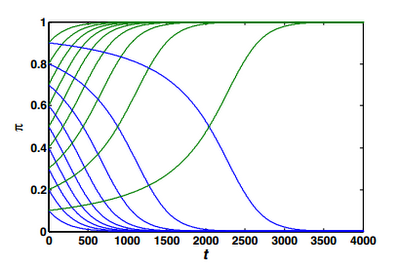

| Visitors Now: | |
| Total Visits: | |
| Total Stories: |

| Story Views | |
| Now: | |
| Last Hour: | |
| Last 24 Hours: | |
| Total: | |
Prisoner Dilemma, which was used Cold War Politics Strategizing, has Winning Solutions
From
Technology Review – The world of game theory is currently on fire. In May, Freeman Dyson at Princeton University and William Press at the University of Texas announced that they had discovered a previously unknown strategy for the game of prisoner's dilemma which guarantees one player a better outcome than the other.
That's a monumental surprise. Theorists have studied Prisoner's Dilemma for decades, using it as a model for the emergence of co-operation in nature. This work has had a profound impact on disciplines such as economics, evolutionary biology and, of course, game theory itself.
The game is this: imagine Alice and Bob have committed a crime and are arrested. The police offer each one a deal–snitch and you go free while your friend does 6 months in jail. If both Alice and Bob snitch, they both get 3 months in jail. If they both remain silent, they both get one month in jail for a lesser offence.
What should Alice and Bob do?
If they co-operate, they both spend only one month in jail. Nevertheless, in a single game, the best strategy is to snitch because it guarantees that you don't get the maximum jail term.
However, the game gets more interesting when played in repeated rounds because players who have been betrayed in one round have the chance to get their own back in the next iteration.
Until now, everyone thought the best strategy in iterative prisoner's dilemma was to copy your opponents behaviour in the previous round. This tit-for-tat approach guarantees that you both spend the same time in jail.
That conclusion was based on decades of computer simulations and a certain blind faith in the symmetry of the solution.
So the news that there are other strategies that allow one player to not only beat the other but to determine their time in jail is nothing short of revolutionary.
The new approach is called the zero determinant strategy (because it involves the process of setting a mathematical object called a determinant to zero).
Arxiv – Winning isn't everything: Evolutionary stability of Zero Determinant strategies (5 pages)
Zero Determinant (ZD) strategies are a new class of probabilistic and conditional strategies that are able to unilaterally set the expected payoff of an opponent in iterated plays of the Prisoner's Dilemma irrespective of the opponent's strategy, or else to set the ratio be- tween a ZD player's and their opponent's expected payo ff. Here we show that while ZD strategies are weakly dominant, they are not evolutionarily stable and will instead evolve into less coercive strategies. We suggest that ZD strategies with an informational advantage over other players that allows them to recognize other ZD strategies will be evolutionarily stable (and able to exploit other players). However, such an advantage is bound to be short-lived as opposing strategies evolve to counteract the recognition.
See more and subscribe to NextBigFuture at 2012-08-16 11:49:41 Source: http://nextbigfuture.com/2012/08/prisoner-dilemma-which-was-used-cold.html
Source:



